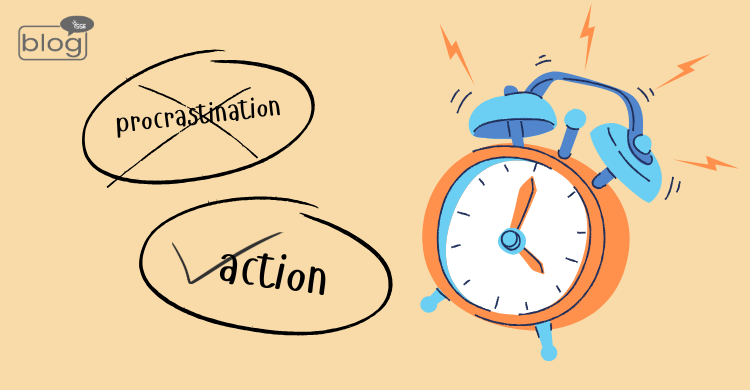‘Procrastination’ is the name of a common problem all of us go through in our lives, at one point or another. It basically refers to a situation of delaying or postponing a task and we often delve into the problem by saying “I’ll do that later/tomorrow.” Eventually, the ‘later’ becomes much later and sometimes the ‘later’ never actually comes. We, human beings, somehow make procrastination embedded in our nature, which ultimately brings no good to our life. A little procrastination isn’t that harmful as we can get over it easily, but, when it turns into a cycle, it becomes really hard to break and get rid of it. Also, this may lead one to stress, reduced productivity, and missed opportunities.
Though the answer to the question “Why do we procrastinate?” differs from person to person, some common causes are given here:
Fear of Failure: We often fear the outcome before commencing any task. Thinking that the consequence will be negative, anxiety about not meeting expectations takes over us.
Perfectionism: While striving to be a perfectionist, people lag, which may prevent starting a task.
Lack of Motivation: Some tasks may feel boring or irrelevant, and eventually they tend to lead one to avoidance.
Overwhelm: If a task seems too large, one may not feel encouraged to make any effort.
It is really important to know the tips and tricks of avoiding procrastination before it makes our lives more messy. However, before taking any major steps or consulting doctor to overcome procrastination, it is significant to know if you are actually going through the cycle of procrastination.
A short description of the cycle is given here:
Avoiding task: The course of the cycle starts with avoiding tasks if the task seems unpleasant.
Brief comfort: When you avoid a task or decide to complete it later, you may feel quick relief.
Stress enhancement: When the time starts ticking, you get overwhelmed by the piled-up tasks.
Poor outcome: For rushing the work to get it done in a very short time, the outcome may get very poor in quality.
Regret: The last symptom is the regret you feel for giving such a low performance.
It is evident to realize if you are ending up in the cycle it’s only you who can break the chain of the cycle. Though the strategies a person should follow completely depend on his situation, some practical strategies everyone can follow in general to overcome procrastination are given below:
Do not force yourself to do any task at once:
If a task seems a little tough or lengthy, you can divide it into smaller parts. You can conduct one part at a time. It will help you to complete the task without feeling burdened.
Make a to-do list and do accordingly:
If you are in a situation where you need to perform multitasking, you may create a to-do list. Categorize the tasks according to their importance. Follow the list, do get done with the urgent ones first and then the other ones.
Set your goals:
Do set some specific goals. For instance, instead of writing an objective like ‘I have to finish science,’ write ‘I have to finish chapter 2 by 5 pm.’ It will help you to focus on a specific goal.
Practice the Two-Minute rule:
There is a Two-Minute rule that suggests that you should complete a task immediately if it takes 2 minutes or less than 2 minutes. Tasks that are minor or smaller in size often slip off our mind.
Use Time Management Techniques:
One of the most powerful tools to combat procrastination is to learn time management skills. There are many time management techniques you can follow, for instance, The Pomodoro Technique, Eisenhower Matrix, Parkinson’s Law, Time Blocking Method, Getting Things Done Method, Rapid Planning Method, etc.
Reward yourself:
Make a promise to your own that if you get a specific task done, you will reward yourself. This technique can motivate you to get things done faster.
Set deadlines:
Set up a personal deadline before the original deadline. You can use apps like Trello and Todoist to track your own tasks and deadlines.
Anticipate success:
Do think about positive outcomes. If you keep thinking that your outcome will not be up to mark, it will eventually lead you to a mental breakdown.
Embrace yourself:
Try to embrace your flaws and mistakes slowly. If you have been procrastinating for a long time now, forgive yourself and make your self-esteem stronger to free yourself from the procrastination cycle.
Stay Consistent:
Keep on trying. It is not easy to eliminate procrastination from your life at once. Keep targeting goals and motivate yourself with every success. Consistency is the key to long-term change.
Start now—because the best time to act is always today.
To read more blogs, click here
Writer
Kazi Mirana Mainuddin
Intern, Content Writing Department
YSSE

